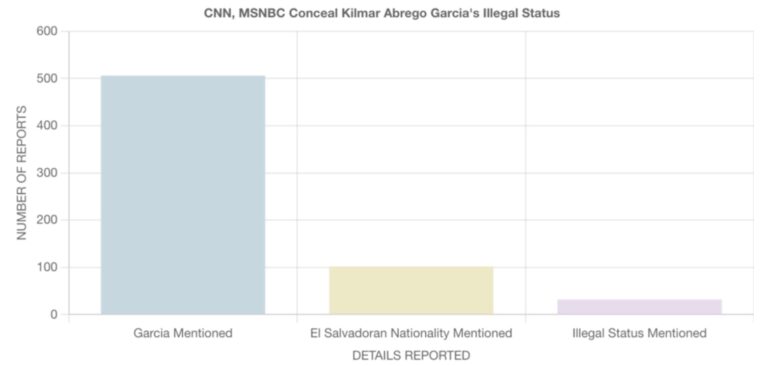By DAVID IGNELL
The recent obsession of the mainstream media over the due process rights of illegal aliens turns my stomach.
Serving as an echo chamber to amplify opinions of Democrat politicians and judges appointed by them, the media has attempted to use the Trump administration’s deportation of 29-year-old Kilmar Abrego-Garcia to portray our President as a reckless and dangerous leader.
Even Alaska’s Republican Sen. Lisa Murkowski has joined ranks with the Democrat choir, declaring “we are all afraid.”
The media, politicians and judges have gone to great lengths to undermine police evidence and previous judicial findings regarding Abrego-Garcia’s affiliation with the dangerous M-13 gang. They’ve minimized suspicions of his involvement in human trafficking and even downplayed the 2021 domestic violence restraining order his wife obtained against him claiming he “punched and scratched Petitioner, ripped off shirt, grabbed and bruised Petitioner.”
In another deportation case, US District Court Judge Brian Murphy, appointed in 2024 by former President Biden, recently ruled that illegal aliens must be given a “meaningful opportunity” to assert their claims.
It’s upsetting to observe this coordinated outcry for the due process rights of illegal aliens and then think of the silence regarding the injustice endured by Thomas Jack Jr., an Alaskan citizen incarcerated for the past 15 years.
Jack is in prison because his due process rights were egregiously violated, yet the media and Democrat politicians and judges who know about his case have repeatedly ignored pleas for help.
Jack, an Alaska Native, was twice denied a jury of his peers. The Tribal Council of the Hoonah Indian Association has specifically found that “reasonable doubt existed in considerable abundance regarding the charges brought against Mr. Jack, and that he would likely have been acquitted of all charges had he been tried by a jury of his peers.”
The Tribal Council also specifically found that “not having been found guilty by a jury of his peers, Mr. Jack continues to be presumed innocent under the law.” The Tribal Council has asked for Jack to be freed from prison pending the State’s decision whether to retry him in a fair trial before a jury of his peers.
Jack’s conviction came only after a Juneau judge forced a patently unfair trial to proceed despite being told by Jack’s newly State-appointed attorney “there is absolutely no way I could be minimally competent to try this case.”
Pastor Bob Barton, a decorated military pilot and key witness in the Jack case, has stated: “I expected that the charges against Thomas would be dropped as soon as [the] allegations had been properly investigated. I never expected Thomas’ case to go to trial and can’t imagine how he could be convicted in a fair trial by an impartial jury.”
Judge Murphy, do you think Jack was given a “meaningful opportunity” under the Constitution before being sent away to prison for 50 years?
The cases for Jack’s innocence and denial of due process rights are considerably stronger than Abrego-Garcia’s on both substantive and procedural grounds. Abrego-Garcia entered the country illegally in 2012. He doesn’t qualify for asylum because of his several year delay in applying for it.
Abrego-Garcia’s rights are limited to the effect of a Withholding of Removal order, signed in 2019 by an administrative law judge under the direction of the executive branch of the US Department of Justice.
In that proceeding, Abrego-Garcia agreed the United States has the right to remove him. The order specifically “confers only the right not to be deported to a particular country, rather than the right to remain in the US.”
The Trump Administration not only had the right to deport Abrego-Garcia, but they had his acknowledgment of that right.
Jack has been incarcerated for 15 years, Abrego-Garcia for less than two months; Jack and his family have suffered considerably more hardship. Both constitutional and humanitarian principles dictate that Jack should receive as much, if not more, support from the mainstream media, Democrat politicians and their judges. However, Jack has received none whatsoever. Why is that?
US Sen. Chris Van Hollen provided the brutally honest admission Sunday during his appearance on NBC’s Meet the Press – it’s all political.
In responding to California Gov. Gavin Newsom’s warning that the Abrego-Garcia situation is the “distraction of the day,” Van Hollen smiled and said:
“I don’t think it’s ever wrong to stand up for the Constitution. And this is not about one man. If you deny the constitutional rights of one man, you threaten the constitutional rights for everybody. I think Americans are tired of elected officials or politicians who are all finger to the wind — what’s blowing this way, what’s blowing that way. And anybody who can’t stand up for the Constitution and the right of due process doesn’t deserve to lead.
Van Hollen spoke the truth and, in the process, threw under the bus his fellow Democrat Party politicians in Alaska who have ignored the lack of due process in Jack’s case.
For years I’ve tried in vain to get Juneau’s state politicians, all Democrats, to do something about Jack’s wrongful conviction. Sen. Jesse Kiehl, Rep. Sara Hannan, and Rep. Andi Story are all aware of the disturbing facts behind the denial of Jack’s due process rights. Yet they held their fingers up to the wind and ignored the facts. Under Van Hollen’s standard, they don’t deserve to lead.
Matt Claman from Anchorage, currently Chair of the Senate Judiciary Committee is another Democrat politician familiar with the denial of due process behind Jack’s wrongful conviction but hasn’t spoke up in protest. He doesn’t deserve to lead.
On Elizabeth Peratrovich Day last year, Jack’s 80-year-old mother, family members and supporters rallied on the steps of the Capitol Building in Juneau holding signs requesting justice. Afterwards, the group fanned out throughout the building and handed out flyers specifying multiple violations of Jack’s due process rights. Democrat politicians again held their fingers to the wind and did nothing. They don’t deserve to lead.
Van Hollen has now created a most interesting situation for himself, Newsom and other Democrat politicians. They can’t unring the bell. I’ll send a copy of my article to them and encourage you to do the same. Will they show resolve and stand up for the Constitution and Jack’s due process rights? If not, they don’t deserve to lead either.
David Ignell formerly practiced law in California state and federal courts and was a volunteer analyst for the California Innocence Project. He is currently a forensic journalist and recently wrote a book on the Alaska Grand Jury.








